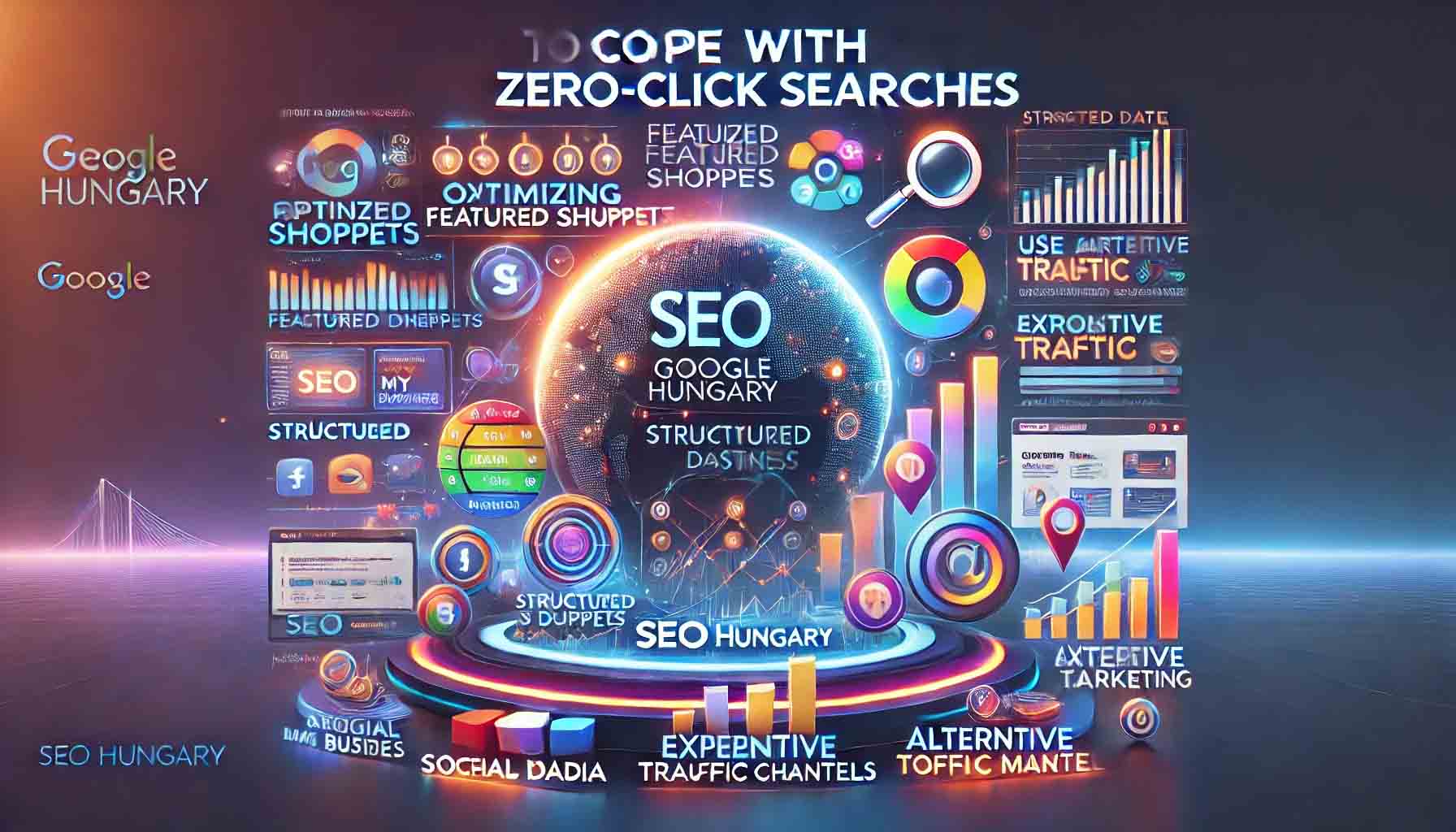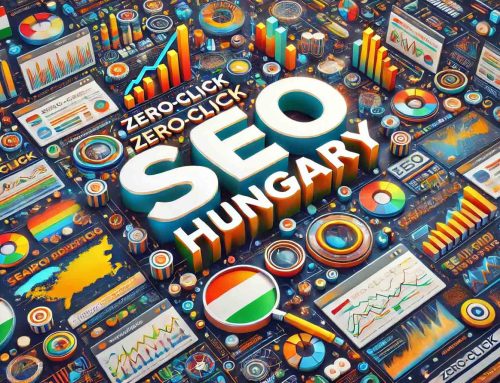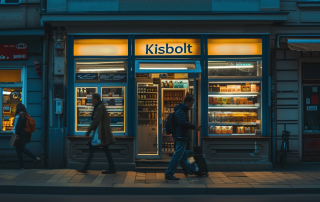
"Zero-click search" is one of the most interesting SEO trends today. This is the type of search when the user receives an answer to his question on the results page, without clicking on any link. For example, if someone types a simple question like "What's the weather like in Budapest?", then a Google it displays the answer directly and there is no need for the user to click on any web page.
Some common examples of zero-click searches are:
- Featured snippets: Short answers at the top of the results that answer the user's question.
- Knowledge panels: These present information about famous people, places and events on the results page.
- Google Maps results: Instant display of local shops, services or restaurants in map form.
- Weather forecasts and quick answers: Data that appears immediately, such as the weather, definitions or simple calculations.
This trend has become popular because Google aims to improve the user experience. The search giant aims to provide users with relevant information as quickly and simply as possible, thus reducing the need to navigate between pages. However, this can have a serious impact on organic traffic, since if users do not click on the results, it reduces the number of visitors to the websites.
In this article, we will explain in detail how these zero-click searches affect your organic website traffic and what strategies you can use to cope with this new trend.

Spread of zero-click searches
In recent years, there has been a dramatic increase in the proportion of zero-click searches, and this trend will accelerate even more between 2020 and 2024. According to statistics, in 2020 all searches are more than 65% was a zero-click hit, especially the on mobile devices, where quick access to simple information is of prime importance. Although it is lower than desktop searches, it is still remarkable that the number of zero-click searches is constantly increasing, which has a serious impact on website traffic.
Trends and growth rates from 2020 to 2024
- in 2020 the mobile a significant part of searches on devices, approx 77%-ka it was a zero-click search, which is expected to continue to grow by 2024.
- This is the ratio for desktop searches 47%, but it's also steadily rising as Google provides more and more instant answers.
- Thanks to increasingly sophisticated search algorithms and continuous improvement of the user experience, Google aims to make users spend even less time away from the search results page.
Zero-click searches by industry
- E-commerce: Featured product details and quick price comparisons have a major impact on e-commerce sites as well. Increasingly, users are getting direct answers to product information on the Google search results page without ever visiting the page.
- Local businesses: Google Maps results dominate local business searches. For example, if someone searches for a restaurant, they immediately see contact information, directions, and even reviews.
- Healthcare: The health care to questions often immediate answers appear, with highlighted details based on medical sources.
- Entertainment: In the entertainment industry, for movies, music artists or events, Google Knowledge Panels provide direct answers such as dates or biographical information.
These industries are particularly susceptible to zero-click searches, as instant responses are often available, reducing the number of clicks to pages. To successfully adapt to these trends, it's important to consider which industry-specific solutions can affect your website's organic traffic.

How do zero-click searches affect organic traffic?
One of the biggest challenges with zero-click searches is that they can take significant traffic away from websites. While ranking your website is still important, zero-click results are making it increasingly difficult to drive users directly to your site. This is especially true for queries that require quick responses and that Google can display on the results page immediately.
Decrease in organic traffic
Many websites are finding that even though they are still doing well in the rankings, their organic traffic is declining. For example, if your website offers a medical definition and it appears in the featured details, Google will display the answer already on the results page, so users don't need to click through to your website. The result: high visibility, but low click-through rates.
According to a study, in 2020 all searches 65% was zero-click, and this rate has been increasing ever since. This is especially challenging for mobile searches, where users are looking for quick, easy answers. In industries such as healthcare and e-commerce, this phenomenon is particularly common, as users in these sectors expect short, to-the-point answers.
How does Google "steal" traffic?
Google displays more and more content on the search results page, such as featured details, knowledge panels, or even map results for local searches. In this way, Google "uses" the content of the web pages without users having to actually visit the given page.
One of the biggest problems is that these pieces of content provide direct answers to users' questions, reducing the chances of them clicking through to your site. For example, "What is the best time in Budapest?" to the question, the user receives the answer in the form of the weather forecast already on the results page.
Improved visibility but lower CTR
Although Google is providing more and more information directly on the results page, this does not necessarily translate into better results in terms of website traffic. Visibility may improve, as being featured on the results page increases brand awareness, but click-through rates (CTR) may decrease. According to statistics, highlights are more than with 50% they can reduce the click-through rate, even if your content appears on the results page.
The role of user intent
Zero-click searches often appear when user intent requires quick answers. In such cases, Google aims to immediately satisfy the user's need, be it dates, definitions or calculations. With these types of searches, it's inevitable that organic traffic will drop, as users won't feel the need to keep browsing through the web pages.
This phenomenon is a challenge for all websites, especially those that rely on informational content. In order to stay competitive, it is important to understand which queries can be answered immediately by Google and to increase your visibility by optimizing such content.

How to deal with zero-click searches?
Despite the rise of zero-click searches, you can optimize your website with a number of strategies to remain relevant and attract valuable traffic. The goal is not only to reach the places featured by Google, but also to create content that attracts visitors and results in a higher interaction rate.
Optimization of featured snippets
One of the most important methods is the optimization of featured snippets. If Google considers your content to be the perfect answer to a user question, you have a chance to appear at the top of the search results page, among the featured details. For this you need to pay attention to the following:
- Structured data application: Structured data (e.g. JSON-LD) enables search engines to better understand the content of your website. This helps Google index and rank your content better.
- Format text in question-answer style: It is question-and-answer style content is often highlighted. For example, if your blog answers a specific question, your chances increase.
- Using tables and lists: Google likes to use lists and tables for highlighted details, so it's worth integrating these into your content.
Finding alternative traffic channels
Since zero-click searches result in fewer clicks from the results page, it is worth taking advantage of other traffic sources:
- Social media and email marketing: These can be more direct ways to reach users. If you are also present on social media platforms, you can more easily present your content to the target audience.
- Creating video content: Video content is playing an increasingly important role and is less affected by the zero-click phenomenon. YouTube, for example, can be an excellent platform for increasing search traffic.
Local SEO optimization
It is especially important for local businesses to optimize their content for local searches:
- Google My Business maintenance: Regularly update your Google My Business page to provide up-to-date information to users who search through the map results.
- Optimizing ratings: User reviews and ratings have a big impact on local search results. Collect positive feedback as it builds trust and visibility.
Content expansion and value addition
Google is giving more and more instant answers, but if you create content that is more in-depth than a featured snippet can provide, you can still succeed in getting traffic:
- "How" type contents: Detailed guides, case studies, or analyzes provide longer and more in-depth answers than Google can provide directly.
- Case studies and analysis: It's like that type content can be interesting to the target audience and encourage them to click further.
This is the strategy ensures that you are not only present on the search results pages, but also in a way that generates more clicks and more traffic. The image below illustrates these solutions and strategies well.

Future trends and the development of SEO in the zero-click world
The future growth of zero-click searches is not in question, as Google and other search engines are increasingly striving to optimize the user experience. The goal is still that search results provide direct answers as quickly as possible, which can lead to a further increase in the rate of zero-click results.
Will zero-click searches continue to grow?
The trends so far show that the rate of zero-click searches is constantly increasing, and it is becoming more common especially for mobile and voice searches. Users increasingly expect fast, immediate answers, and Google's advanced algorithms can provide this.
According to a forecast for 2024, the rate of zero-click hits will be up to You can also reach 70% in mobile searches and will continue to grow with technological innovations like a Artificial Intelligence and machine learning.
How can these new trends shape future SEO strategies?
In order to SEO professionals to successfully compete with zero-click trends, new approaches will be needed. Instead of the previous "keyword-centric" strategies, user intent is even more central. Deeper understanding of user needs and optimizing content in a way that provides value becomes key.
Furthermore, in addition to traditional organic traffic strategies, alternative traffic sources, such as social media, e-mail, will play an increasingly important role. marketing, and video content. The SEO of the future will also aim to maximize the presence on different platforms in order to mitigate the effects of zero-click searches.
The role of AI and machine learning
THE Artificial Intelligence (AI) and machine learning already have a significant impact on the operation of search engines, and this will only increase in the future. With the help of AI, Google can provide more and more personalized results, which can result in even more accurate answers. This also means that with AI-driven content recommendations, we can see even more results tailored to individual user needs.
Such technological innovations are expected to reduce traditional click-through rates (CTRs), as search engines answer user questions directly on the results page.
In conclusion, the future of zero-click searches inevitably points in the direction of AI and machine learning, where the user experience becomes the central element of the search process. THE SEO professionals must therefore develop new strategies to remain relevant in order to maximize traffic.

Finally….
The world of zero-click searches can be a serious challenge, but it also offers new opportunities to website owners. Although at first glance it may seem negative that users stay on the search results page without clicking on your website, by applying the right optimization techniques you can increase the visibility of your page and maintain organic traffic.
It is important not to consider zero-click searches exclusively as a disadvantage. If you successfully appear in featured details or provide relevant information in search results, you can increase your brand awareness even if organic traffic temporarily decreases. By optimizing your content and using structured data, you can ensure that you continue to occupy a valuable place in the search results between.
In the future, it will also be essential to monitor continuous changes, follow the development of AI and machine learning, and adapt to new trends. The successful SEO the secret lies in being able to adapt to new search habits while also exploring alternative channels such as social media or video content.






